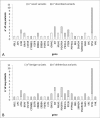Mutational analysis of single circulating tumor cells by next generation sequencing in metastatic breast cancer
- PMID: 27034166
- PMCID: PMC5041968
- DOI: 10.18632/oncotarget.8431
Mutational analysis of single circulating tumor cells by next generation sequencing in metastatic breast cancer
Abstract
Circulating Tumor Cells (CTCs) represent a "liquid biopsy" of the tumor potentially allowing real-time monitoring of cancer biology and therapies in individual patients.The purpose of the study was to explore the applicability of a protocol for the molecular characterization of single CTCs by Next Generation Sequencing (NGS) in order to investigate cell heterogeneity and provide a tool for a personalized medicine approach.CTCs were enriched and enumerated by CellSearch in blood from four metastatic breast cancer patients and singularly isolated by DEPArray. Upon whole genome amplification 3-5 single CTCs per patient were analyzed by NGS for 50 cancer-related genes.We found 51 sequence variants in 25 genes. We observed inter- and intra-patient heterogeneity in the mutational status of CTCs.The highest number of somatic deleterious mutations was found in the gene TP53, whose mutation is associated with adverse prognosis in breast cancer.The discordance between the mutational status of the primary tumor and CTCs observed in 3 patients suggests that, in advanced stages of cancer, CTC characteristics are more closely linked to the dynamic modifications of the disease status.In one patient the mutational profiles of CTCs before and during treatment shared only few sequence variants.This study supports the applicability of a non-invasive approach based on the liquid biopsy in metastatic breast cancer patients which, in perspective, should allow investigating the clonal evolution of the tumor for the development of new therapeutic strategies in precision medicine.
Keywords: breast cancer; circulating tumor cells; next generation sequencing; single cell sequencing; somatic mutations.
Conflict of interest statement
The authors declare no potential conflicts of interest.
Figures




Similar articles
-
Heterogeneity of PIK3CA mutational status at the single cell level in circulating tumor cells from metastatic breast cancer patients.Mol Oncol. 2015 Apr;9(4):749-57. doi: 10.1016/j.molonc.2014.12.001. Epub 2014 Dec 9. Mol Oncol. 2015. PMID: 25539732 Free PMC article.
-
Dissection of major cancer gene variants in subsets of circulating tumor cells in advanced breast cancer.Sci Rep. 2019 Nov 21;9(1):17276. doi: 10.1038/s41598-019-53660-x. Sci Rep. 2019. PMID: 31754145 Free PMC article.
-
Mutation Analysis of Cell-Free DNA and Single Circulating Tumor Cells in Metastatic Breast Cancer Patients with High Circulating Tumor Cell Counts.Clin Cancer Res. 2017 Jan 1;23(1):88-96. doi: 10.1158/1078-0432.CCR-16-0825. Epub 2016 Jun 22. Clin Cancer Res. 2017. PMID: 27334837 Free PMC article.
-
Progress and challenges of sequencing and analyzing circulating tumor cells.Cell Biol Toxicol. 2018 Oct;34(5):405-415. doi: 10.1007/s10565-017-9418-5. Epub 2017 Nov 22. Cell Biol Toxicol. 2018. PMID: 29168077 Free PMC article. Review.
-
The diagnostic potential of mutation detection from single circulating tumor cells in cancer patients.Expert Rev Mol Diagn. 2017 Nov;17(11):975-981. doi: 10.1080/14737159.2017.1381561. Epub 2017 Sep 22. Expert Rev Mol Diagn. 2017. PMID: 28931314 Review.
Cited by
-
Circulating Tumor Cells as a Tool for Assessing Tumor Heterogeneity.Theranostics. 2019 Jun 19;9(16):4580-4594. doi: 10.7150/thno.34337. eCollection 2019. Theranostics. 2019. PMID: 31367241 Free PMC article. Review.
-
An Immunological Perspective of Circulating Tumor Cells as Diagnostic Biomarkers and Therapeutic Targets.Life (Basel). 2022 Feb 21;12(2):323. doi: 10.3390/life12020323. Life (Basel). 2022. PMID: 35207611 Free PMC article. Review.
-
Circulating tumor markers: harmonizing the yin and yang of CTCs and ctDNA for precision medicine.Ann Oncol. 2017 Mar 1;28(3):468-477. doi: 10.1093/annonc/mdw619. Ann Oncol. 2017. PMID: 27998963 Free PMC article. Review.
-
Tumour Heterogeneity: The Key Advantages of Single-Cell Analysis.Int J Mol Sci. 2016 Dec 20;17(12):2142. doi: 10.3390/ijms17122142. Int J Mol Sci. 2016. PMID: 27999407 Free PMC article. Review.
-
Applicability of liquid biopsies to represent the mutational profile of tumor tissue from different cancer entities.Oncogene. 2021 Aug;40(33):5204-5212. doi: 10.1038/s41388-021-01928-w. Epub 2021 Jul 6. Oncogene. 2021. PMID: 34230613 Free PMC article.
References
-
- Shlush LI, Hershkovitz D. Clonal evolution models of tumor heterogeneity. Am Soc Clin Oncol Educ Book. 2015;35:e662–e665. - PubMed
-
- Alix-Panabières C, Pantel K. Circulating tumor cells: liquid biopsy of cancer. Clin Chem. 2013;59:110–118. - PubMed
-
- Gasch C, Bauernhofer T, Pichler M, Langer-Freitag S, Reeh M, Seifert AM, Mauermann O, Izbicki JR, Pantel K, Riethdorf S. Heterogeneity of epidermal growth factor receptor status and mutations of KRAS/PIK3CA in circulating tumor cells of patients with colorectal cancer. Clin Chem. 2013;59:252–260. - PubMed
-
- Fabbri F, Carloni S, Zoli W, Ulivi P, Gallerani G, Fici P, Chiadini E, Passardi A, Frassineti GL, Ragazzini A, Amadori D. Detection and recovery of circulating colon cancer cells using a dielectrophoresis-based device: KRAS mutation status in pure CTCs. Cancer Lett. 2013;335:225–231. - PubMed
MeSH terms
Substances
LinkOut - more resources
Full Text Sources
Other Literature Sources
Medical
Research Materials
Miscellaneous

